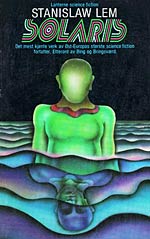
![]() verkisto
verkisto
7/26/2016
![]()
For years, I've heard about how good an author Lem is. I remember looking for his books in graduate school, but his popularity, combined with the scarcity of translated editions, meant I never could find them, even in secondhand bookshops. For whatever reason, I remembered a few weeks ago that I had wanted to read something of his, and after some research, figured that Solaris was a good place to start. The premise definitely appealed to me, and although I hadn't seen the film -- or even realized that it had been made into one -- that it had was also reassuring.
The premise of the novel is unique: A psychologist from Earth is taking an assignment on the planet Solaris, where the ocean on the planet appears to be sentient. The planet has given researchers a lot of fodder, to the point where volumes of scientific theories have been published, and the people who devote their studies to the ocean are deemed "Solarists." When the psychologist arrives at the station, he realizes that his predecessor is dead, and he learns that the two other surviving researchers are acting odd. When he wakes one morning to find a long lost love of his beside his bed -- who has also been dead for over ten years -- he realizes that there's more to the ocean than just its sentience.
This is a hard SF novel; the author spends a lot of time detailing the hows and whys of how the ocean exists, and posits a lot of theories to explain its existence. A lot of it went over my head, but it was interesting to read that much detail about the fictional planet. It also helped ground the novel in reality. I've read a handful of fantasy/science-fiction/horror novels that seem satisfied to say, "No one knows why it's like that," and while that's fine (in most cases, it's not really necessary to the story; in fact, with Solaris, it's not really necessary, either), it's nice to see an author put that much effort into the backstory.
Unfortunately, that much detail detracts a lot from the novel as a story. In some places, the novel reads more like a research paper, since at least half of the novel is spent showing the main character reading the literature surrounding the planet. These are the points where we learn all the theories about how the ocean is sentient, and what all of the creations seem to indicate. The story behind all of the science centers on the psychologist and his reincarnated love, and the process by which they both deal with the situation at hand.
The story is powerful, and I think its message makes the story worth reading. Fans of science fiction will like it, but I can see a casual reader finding a lot to take from the story, as well. I hesitate to recommend it without hesitation, partly because of the hard science behind the story, and also because the story is very dated. It was originally published in 1961, and the role of the female character is very much a product of its time. Still, the book is intriguing, and I would be interested in reading more of Lem's works.